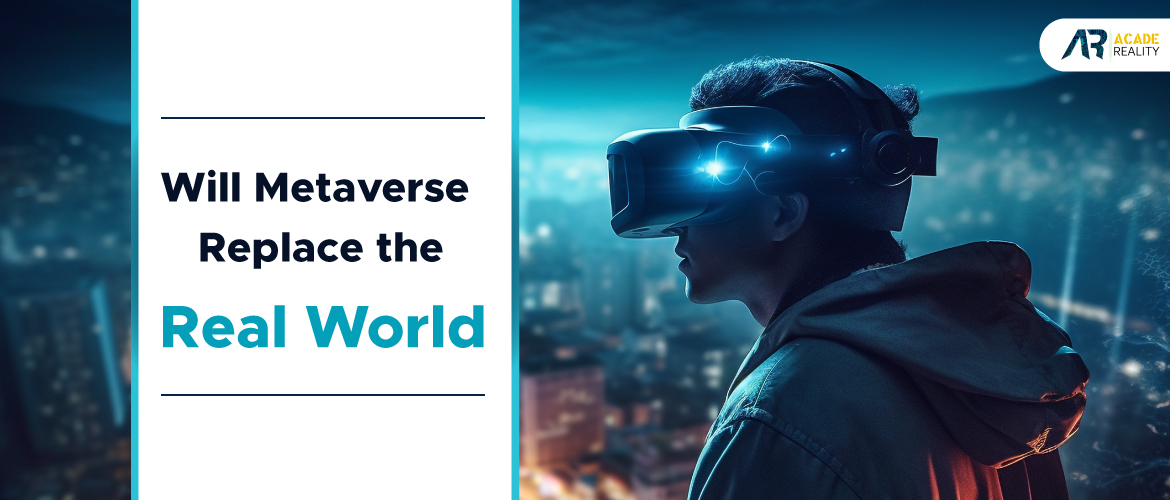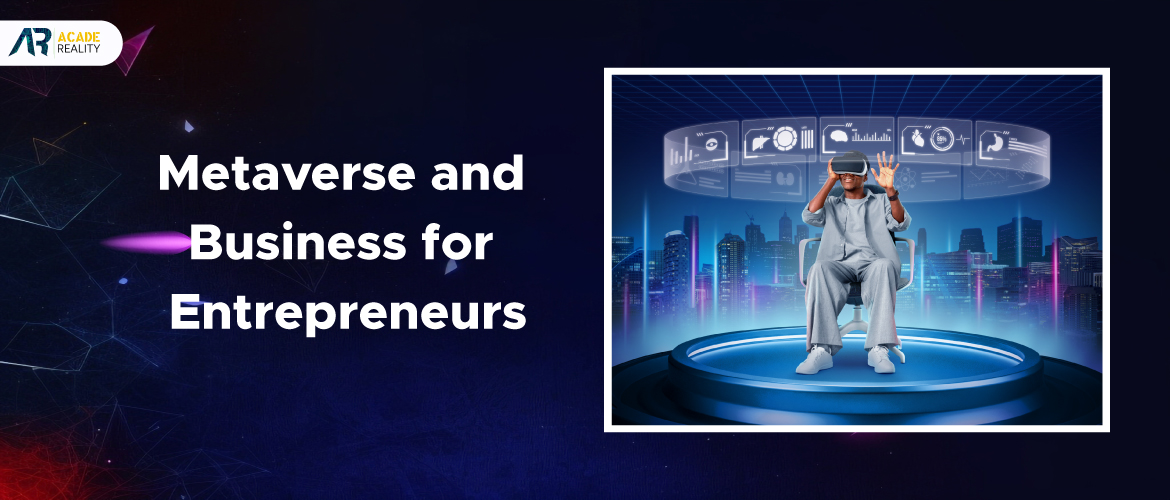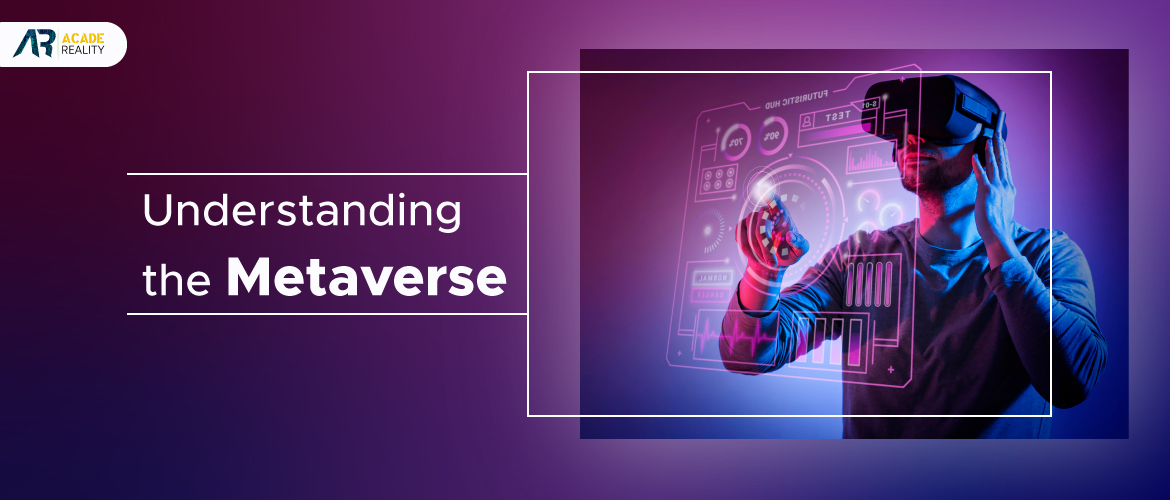Leatest Blogs
Will Metaverse Replace the Real World?

In recent years, the concept of the metaverse has captured the imagination of tech enthusiasts and futurists alike. But what exactly is metaverse replacing the real-world as we know it? While the metaverse offers immersive virtual experiences and opportunities for social interactions, it cannot replicate the physical reality and tangible experiences that the real world provides. Additionally, practical limitations and ethical considerations need to be addressed before the metaverse can become a full substitute for the real world.
This blog post will delve into the metaverse, its current state, future potential, strategies for its development, and whether it could truly supplant our physical reality.
Metaverse Overview
Before we dive into the debate, let's start with a metaverse overview. The term "metaverse" refers to a virtual, interconnected space transcending individual digital platforms. It combines augmented reality (AR), virtual reality (VR), and the internet to create immersive, shared experiences. Users can navigate this digital realm through avatars, interact with others, and engage in activities similar to those in the physical world.
Metaverse in Today's World
As of now, the metaverse is still in its infancy. Companies like Facebook (now Meta), Google, and Epic Games invest heavily in creating metaverse-like experiences, but the true realization of a fully functional metaverse is a work in progress. Today, we see elements of the metaverse in online multiplayer games, social VR platforms, and virtual worlds like Second Life. These environments offer a glimpse into what a future metaverse could look like, with users adopting digital avatars to engage in various activities.
Is Metaverse Replacing the Real World
The emergence of the metaverse, a digital realm where virtual and physical worlds converge, has ignited a captivating debate about whether the metaverse is replacing the real world. Yes, it has the potential to replace the real world.
As we embark on this journey of discovery, it's crucial to start by examining key facets of this ongoing conversation.
1. Evolving Social Interactions
One of the primary arguments for the metaverse replacing the real world is the potential transformation of social interactions. People can connect, collaborate, and communicate in new and exciting ways with the metaverse. Virtual gatherings, conferences, and social events can replicate many aspects of in-person experiences, reducing the need for physical presence.
2. Work and Education
The metaverse also has the potential to reshape the way we work and learn. Remote work and virtual classrooms have become increasingly common, and the metaverse could take this to the next level. Companies and educational institutions may opt for metaverse-based offices and classrooms, reducing the need for physical office space and campuses.
3. Entertainment and Recreation
Entertainment and recreation are integral parts of our lives. The metaverse offers limitless possibilities for immersive gaming, virtual tourism, and entertainment experiences. As these experiences become more realistic and engaging, people may spend more time in the metaverse for leisure activities.
Metaverse Strategy
Building a metaverse is a complex endeavor that requires careful planning and collaboration among tech giants, startups, and various stakeholders.
Some key strategies for metaverse development include:
1. Interoperability
Ensuring that different metaverse platforms can seamlessly connect and interact with each other is crucial for fostering a unified metaverse ecosystem
2. Privacy and Security
As users spend more time in the metaverse, safeguarding their data and ensuring online safety will be paramount. Robust security measures and privacy controls are essential.
3. Content Creation
Encouraging user-generated content and creativity will be vital to the success of the metaverse. Platforms must make it easy for users to create, share, and monetize their digital creations.
4. Monetization Models
Developing sustainable monetization models, such as virtual goods, advertising, and subscription services, will be crucial to support the infrastructure and growth of the metaverse.
Metaverse Development Services
It encompasses a range of specialized offerings that support creating, growing, and maintaining virtual and immersive digital environments within the metaverse.
These services are essential for businesses, content creators, and organizations looking to establish a presence, develop applications, and engage with users in the evolving metaverse. Here's an overview of key metaverse development services
- Virtual World Creation: Metaverse development companies can create virtual worlds tailored to specific industries or purposes, such as gaming, education, entertainment, or commerce. It includes designing landscapes, buildings, and interactive elements within the virtual space.
- Metaverse Platforms: Providers of metaverse development services build platforms and ecosystems that enable users to access and interact with the metaverse. These platforms often incorporate features like avatars, social interactions, and marketplaces.
- VR/AR Development: Virtual Reality (VR) and Augmented Reality (AR) development services are crucial for creating immersive experiences within the metaverse. It includes developing applications, games, and simulations that leverage VR and AR technologies.
- Metaverse App Development: Companies offer metaverse app development services to build applications and software that function within the metaverse. These apps can range from virtual offices and shopping experiences to educational tools and entertainment apps.
- Blockchain Integration: Blockchain technology is often used in the metaverse to establish digital ownership, facilitate secure transactions, and create unique digital assets (NFTs). Developers integrate blockchain into metaverse environments to ensure transparency and trust.
- AI and Machine Learning: Artificial Intelligence (AI) and Machine Learning (ML) are used to enhance user experiences within the metaverse. AI-driven chatbots, virtual assistants, and content recommendation systems can provide personalized interactions.
- 3D Modeling and Animation: 3D modeling and animation services are essential for creating lifelike avatars, objects, and environments within the metaverse. This includes character design, object modeling, and animation rigging.
- Security and Privacy Solutions: As the metaverse grows, ensuring security and privacy becomes paramount. Metaverse development services include implementing encryption, authentication, and access controls to protect user data and assets.
- Community Building and Moderation: Building and maintaining a vibrant metaverse community is crucial. Service providers offer tools and services for community management, user engagement, and content moderation.
Challenges and Considerations
While the metaverse presents exciting opportunities, it poses several challenges and considerations.
1. Privacy and Security
The metaverse will store vast amounts of personal data, raising concerns about privacy and security. Users must trust metaverse developers to safeguard and protect their information from potential threats.
2. Digital Divide
Not everyone has access to technology in the same way and high-speed internet. The metaverse's growth could exacerbate the digital divide, leaving marginalized communities behind.
3. Real-World Impact
The metaverse may not entirely replace the real world but could blur the lines between the two. Balancing real-world responsibilities with metaverse activities may prove challenging for some individuals.
Metaverse vs. Real World: A Coexistence Perspective
The metaverse is not merely a replacement for the real world but an extension. Just as the internet transformed various aspects of our lives without completely replacing them, the metaverse is poised to do the same. Here are some additional considerations.
1. Economic Opportunities
The metaverse presents substantial economic opportunities. Businesses and entrepreneurs can establish virtual storefronts, sell digital goods, and offer metaverse-related services. This economic activity can create jobs and stimulate economic growth, contributing positively to the real world.
2. Creative Expression
The metaverse is a canvas for creative expression. Artists, musicians, and designers can leverage the limitless possibilities of this digital realm to showcase their talents and reach global audiences. This newfound platform can coexist with traditional art and entertainment forms, enriching our cultural landscape.
3. Education and Skill Development
While the metaverse may be more significant in education, it can complement traditional learning methods. Virtual classrooms, educational simulations, and collaborative projects in the metaverse can enhance students' skills and knowledge while allowing them to engage with peers worldwide.
4. Cultural Preservation
The metaverse can serve as a digital archive for cultural preservation. Historical landmarks, art, and traditions can be digitized and preserved for future generations. This coexistence of the metaverse and cultural heritage can ensure the conservation of our rich history.
Final Thoughts: Embracing the Metaverse
As we contemplate whether the metaverse will replace the real world, it becomes evident that they are not mutually exclusive. Instead, they can coexist, offering a range of opportunities, experiences, and challenges. The real world will continue to be the foundation of our physical existence, while the metaverse will expand our horizons in the digital realm.
In this continuously changing environment, it is crucial to approach the metaverse with cautious optimism. We must address the ethical, social, and economic implications while ensuring accessibility and inclusivity remain at the forefront of metaverse development services.
Ultimately, the metaverse is not a threat to the real world but a reflection of our evolving digital society. As we navigate this transition, the key lies in striking a balance that allows both the physical and virtual worlds to thrive harmoniously, enhancing our lives and shaping the future in ways we can only begin to imagine.
You Might Like





